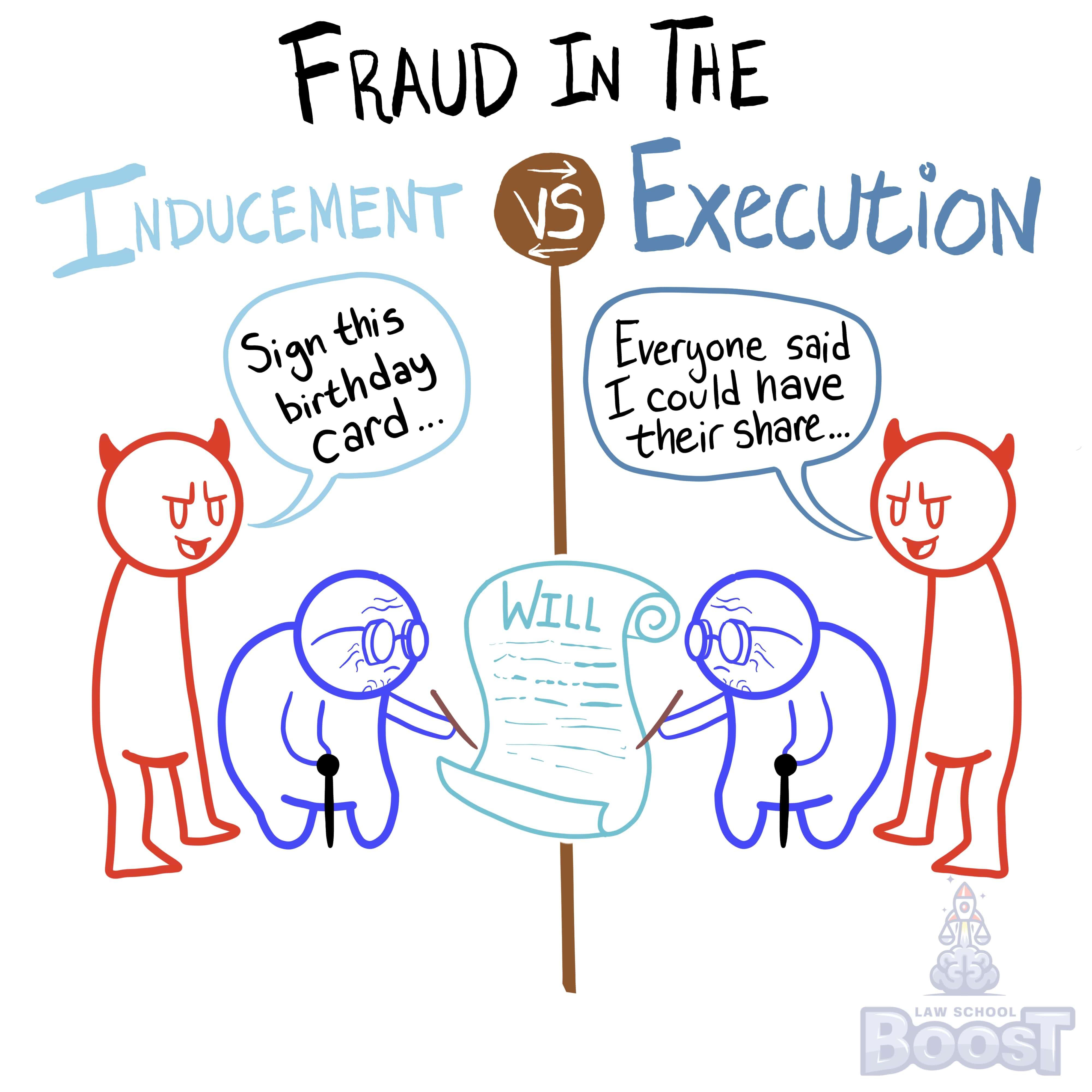😭
Wills • Capacity
WILLS#018
Legal Definition
Fraud in the execution occurs where a testator is misled into executing the instrument by false representations concerning the character or content of an instrument. This type of fraud is very rare.
Plain English Explanation
There are two main types of fraud involving wills that you'll need to know. The first is "fraud in the execution," and the other is "fraud in the inducement." We have separate cards for each, but combine them in this simplified explanation so that it is easy to contrast them.
Fraud in the execution has to do with fraud that targets the moment that a will is executed. In other words, the testator willfully agrees to sign something but they do not realize that the something they are signing is, in fact, a will. It's sort of like if someone pulls a switcheroo and asks a person to autograph a document claiming it is a receipt but it is really a will. It's rare, because it's pretty ridiculous, but you should know it.
Fraud in the inducement on the other hand involves a testator that knows they are signing a will, but they have been lied to or manipulated in a way that influences their decision regarding how to structure their will and what should go into it.
So how do you tell them apart? If someone willfully agrees to sign something without being pressured into it, but they are misled and don't realize they are signing a will, it is fraud in the execution. In contrast, if someone is misled and influenced in a way that convinces them to execute a will, then it is fraud in the inducement.
Fraud in the execution has to do with fraud that targets the moment that a will is executed. In other words, the testator willfully agrees to sign something but they do not realize that the something they are signing is, in fact, a will. It's sort of like if someone pulls a switcheroo and asks a person to autograph a document claiming it is a receipt but it is really a will. It's rare, because it's pretty ridiculous, but you should know it.
Fraud in the inducement on the other hand involves a testator that knows they are signing a will, but they have been lied to or manipulated in a way that influences their decision regarding how to structure their will and what should go into it.
So how do you tell them apart? If someone willfully agrees to sign something without being pressured into it, but they are misled and don't realize they are signing a will, it is fraud in the execution. In contrast, if someone is misled and influenced in a way that convinces them to execute a will, then it is fraud in the inducement.
Hypothetical
Hypo 1: Sam is in the hospital and not doing very well. He can barely stay awake, yet alone take care of his affairs. Bob offers to handle Sam's obligations and make sure his various bills get paid, but he said he needs a Power of Attorney first (a document that would enable Bob to act on behalf of Sam). Sam agrees. Bob gives Sam the documents and Sam signs. Little did Sam realize, but the documents were actually a will that gave all of Sam's property to Bob. Result: Bob pulled a switcheroo on Sam. Sam thought he was signing a Power of Attorney, but he actually signed a will that fraudulently devised all of his property to Bob. This is fraud in the execution, and makes the will voidable.
Visual Aids

Related Concepts
How do you make a prima facie case for undue influence?
In California, can an attorney who drafts a will for their client be a beneficiary?
In California, when is there a statutory presumption of undue influence?
In California, when is there no presumption of undue influence for a donative transfer?
What happens if someone fraudulently prevents someone from creating a will?
What is an insane delusion?
What is fraud in the inducement?
What is required for valid testamentary capacity?
What is required to establish fraud?
What is undue influence?
What relief is available if mistake in the inducement occurs?
When assessing undue influence, what is the presumption test?
When does a mistake in the execution occur and what is the result?


